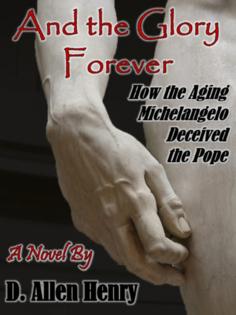Centuries later, Michelangelo’s secret is finally unearthed …
Published in Mom's Advice
D. Allen Henry has a passion for genius, the kind that stands the test of time. He also has a passion for inventing fiction that not only brings geniuses to life but also their legacies to bear in the modern-day era. Adding to his existing set of mysteries surrounding luminaries such as Galileo, Da Vinci and Dante comes his new novel, "And the Glory Forever: How the Aging Michelangelo Deceived the Pope."
Here, Henry crafts a story that is at once a reverent homage to Michelangelo and a high-concept historical thriller, blending fact and fiction with a steady hand. Set against the lush backdrop of Renaissance Italy and the fast-paced modern world, the book explores enduring questions of legacy, secrecy and artistic defiance through a well-structured and intellectually satisfying mystery.
At the center of the tale is a secret concealed for nearly five centuries: a poem hidden inside Michelangelo’s final sculpture, the Rondanini Pietà. Unearthed by a brilliant but fame-hungry scholar, Dr. Raymond Michelson, the poem sets off a modern-day treasure hunt led by series protagonists Paul Woodbridge and Antonietta Floridiana da Vinci — an American academic and his Italian aristocrat wife who have a flair for decoding the past. Together with Raymond, they traverse Florence, Milan and Rome, following Michelangelo’s cryptic final message. What they uncover isn’t treasure (at least not in the conventional sense), but something far more layered: a lost masterpiece, a spiritual statement and a rebuke of the power structures that once commissioned the artist’s genius.
As always, Henry makes history feel alive and consequential. The novel’s appeal lies not in breakneck pacing or dramatic twists but in the slow burn of intellectual discovery. The stakes are more theological and philosophical in nature. You could call it a “thinking man’s thriller.” The clues to the mystery are grounded in Renaissance art and architecture, and Henry invites readers to walk alongside his characters into churches, archives and the realm of memory itself. Henry’s command of the period is evident, but he resists the temptation to overwhelm the reader with exposition. Instead, he lets setting, dialogue and texture do the heavy lifting. The prose is clean and often lyrical, with occasional flourishes that feel earned rather than indulgent.
There is also an emotional undercurrent that elevates the story beyond the mechanics of mystery-solving, however. Henry deftly avoids caricature, keeping his characters realistic and relatable. Paul and Antonietta remain a charming pair — seasoned, affectionate, intellectually matched and often amusing in their banter. Raymond, initially portrayed as pompous, is given room to grow as he confronts the moral implications of his discoveries. Michelangelo emerges as a man at odds with power and torn by duty to his family and faith. In refusing to fulfill the Pope’s final commission and creating a deeply personal Pietà instead, Michelangelo leaves behind not only a statue but a statement that’s a quiet act of artistic redemption.
What makes "And the Glory Forever" particularly compelling is its restraint. In an age of increasingly sensational thrillers, Henry trusts the intelligence of his readers. He lingers in the details, allows ambiguity to stand and offers no easy answers to the questions the book raises: Who owns history? What is art’s role in truth-telling? And when does honoring the past mean keeping it hidden?
This novel is likely to appeal to readers who enjoy thoughtful fiction with a historical backbone — fans of Donna Leon, Iain Pears or early Dan Brown, without the bombast. It’s also a book for those who love Italy and understand that its beauty is not just in the architecture, but in the tension between what has been preserved and what remains undiscovered. Henry has a particular gift for descriptive writing that captures both the physicality of place and the emotional resonance of the lingering traces of historical legacy. Florence, in particular, is rendered as a living museum, pulsing with memory and meaning.
In the end, "And the Glory Forever" is not just about what Michelangelo left behind, but about what we choose to do with the truths we find. It’s a fitting installment to Henry’s unofficial quartet on Italian genius, and a quiet triumph of storytelling, history and reverence for the enduring power of art.










Comments